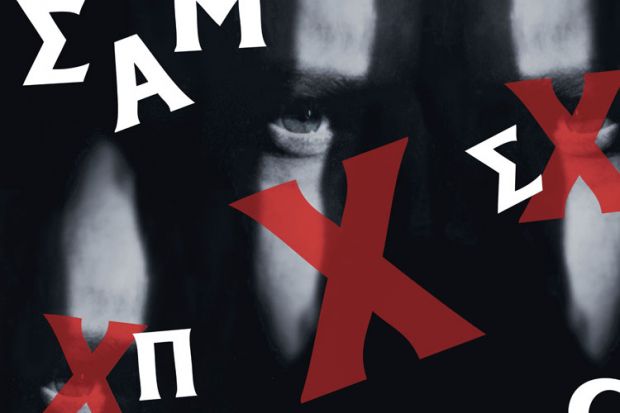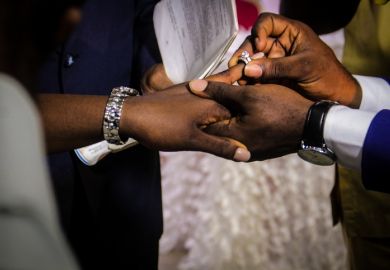Members of US university fraternities and sororities last month gathered at Capitol Hill in Washington to lobby Congress on legislation that is important to them – just as other interest groups do. It is a rite of US politics that fraternities have undergone for two decades, bringing smiling students in suits and ties to meet with law-makers and pose for photos.
But the reception they receive is getting noticeably cooler. High-profile stories of sexual abuse, racist acts and other scandals continue to dog fraternities and their national networks. How serious this image problem has become was evident in the rush to judgement after Rolling Stone magazine reported in November the story of a particularly heinous alleged gang rape at a University of Virginia fraternity – even though the story had to be recanted after an investigation by the Columbia University Graduate School of Journalism found significant flaws in the reporting.
Before descending on Congress, the North-American Interfraternity Conference and the National Panhellenic Conference felt compelled to issue a rare public statement contrasting the reality of fraternities with the “myth”. This reality is highly nuanced.
On the one hand, some fraternities continue to commit misdeeds, even criminal acts, often involving alcohol. These include sexual assaults, the purported mishandling of which by US universities has come under attack.
On the other hand, recent research shows that while they are more likely to smoke and drink, fraternity members are also less likely to drop out. They have higher graduation rates and get better jobs than non-members, too. (The study controlled for race and family background.) All of these are measures on which universities themselves are increasingly judged. This is among the many reasons why, despite perennial debates about their role and the suspension or shutting down of particularly egregious offenders, fraternities continue to thrive at US universities.
“It’s so complex. There are so many moving parts in this,” says Steve Veldkamp, executive director of the Center for the Study of the College Fraternity at Indiana University.
He says the strength of the US fraternity was probably best understood by a Frenchman, Alexis de Tocqueville, who in his text Democracy in America (the first volume of which was published in 1835) described such groups as symbolising the fiercely guarded, sacrosanct privilege of associating outside the boundaries of government.
“The DNA of the fraternity is deep in the roots of this country,” Veldkamp says. “That’s potentially why we’ve held on to these kinds of organisation.”
Today, it is not the government that is forced to contend with the repercussions of too much independence among rowdy students in fraternities (also known as Greek organisations on account of the Greek letters that feature in their names), but the universities with which they are associated. A recent survey of members of the University Risk Management and Insurance Association found that two-thirds think that fraternity behaviour is among their institutions’ top liability risks, although most also said that fraternities were important to campus traditions and viewed the reputational risks they pose as less significant.
But there has been no shortage of scandal or shocking behaviour this year. Members of the Sigma Alpha Epsilon fraternity at the University of Oklahoma, for instance, video-recorded themselves singing a racist chant and vowing never to admit black members. The chapter was thrown off campus and two of its members were expelled. The parent organisation has promised reforms.
Sigma Alpha Mu at the University of Michigan was disbanded by its national headquarters after members allegedly caused $400,000-worth (£263,000) of damage at a ski lodge. Several were criminally charged.
The University of Florida closed its Zeta Beta Tau fraternity after charges that its members spat on and threw bottles at military veterans holding an event at the same beach resort.
Kappa Delta Rho at Pennsylvania State University was suspended for a year by its national head office for posting photographs of naked, unconscious women on its Facebook page.
The University of Wisconsin-Madison stripped Chi Phi of its formal status as a student group for “hazing” pledges – humiliating or abusive initiation rituals – that included making new members wear hoods during a period of isolation and refusing them food.
Pi Kappa Alpha at the University of South Carolina was suspended by its national organisation after a member was found dead under what authorities said were “suspicious circumstances”.
Alpha Tau Omega at North Carolina State University was suspended from campus when a student said that she had been sexually assaulted in the fraternity house. And Baruch College, part of the public City University of New York, this month banned fraternity and sorority initiation rites for three years after a “pledge” died of brain trauma in 2013 at the fraternity Pi Delta Psi, whose chapter there was also shut down.
It is the outcry against sexual assault in particular that has brought new pressure to bear on the fraternities. Last year, female undergraduates across the US started to raise loud protests over what they said were university cover-ups of sexual assaults that could damage the institutions’ reputations. Now the universities are worried about the implications of being found to have done too little in response to such cases.
“That’s a big factor focusing attention on fraternities and sororities,” Veldkamp says.
Research about the connection between fraternities and sexual assault varies widely in its conclusions. A 2007 nationwide study by John Foubert, professor of higher education and students affairs at Oklahoma State University, concluded that fraternity members are three times more likely than non-members to commit such assaults. He cited other studies suggesting that fraternity members are more likely than their male classmates to believe that women like being “roughed up” and want to be forced into sex.
Another authoritative source, insurance company United Educators, which specialises in university legal liability cases, studied 305 sexual assault claims over three years (2011-13). It concluded that about 10 per cent of reported on-campus rapes were allegedly committed by y members, who constitute 9 per cent of the student population; however, 24 per cent of repeat offenders were fraternity members.
University athletes were the accused in 15 per cent of rape cases, United Educators added – about the same proportion as their share of all students. However, they were implicated in 40 per cent of gang rapes.
There is consensus that alcohol is often involved in sexual assault and that fraternities encourage drinking. The National Institute of Justice reports that sexual assault on campus is commonly associated with alcohol, and United Educators says that in 92 per cent of successful legal claims against its client universities for student-on-student sexual assault, the accusers were drunk. In 60 per cent of incidents, they were so drunk they could not remember the assault.

Fraternities are closely associated with loud and raucous parties. Eighty-six per cent of their members engage in binge drinking, that is, drinking large amounts of alcohol in a very short space of time, according to Naspa, the national association of student affairs administrators: that is almost twice the proportion of non-members. And the National Institute of Justice says that more than half of women who report being sexually assaulted while incapacitated say the assault occurred at a party.
While not downplaying these incidents, fraternity associations point out that there are more than 6,000 fraternities on over 800 campuses in the US.
It is also unsurprising that some fraternities have found themselves in trouble time and again – even after being chastised publicly and promising reforms – because their memberships turn over every few years as students graduate, Veldkamp suggests. And students of traditional university age, whether in fraternities or not, are bound to test the boundaries of their freedom, he adds.
“Whether it’s a club at Cambridge that’s steeped in tradition and has a sporting event that it’s passionate about and celebrates afterward, or a fraternity [with] Greek letters that also has a sporting event and celebrates afterward, that’s part of any college experience when you have large numbers of similar-aged students moving away from home and starting to live together,” he says.
However, recent actions of the North-American Interfraternity Conference and the National Panhellenic Conference have done little to distance fraternities from their perceived connection with sexual assault. In March, the bodies called for some aspects of university adjudication in such cases to be put off until the completion of police investigations. Under federal laws prohibiting gender discrimination at any higher education institution that receives government funding, US universities are required to respond to incidents that create a hostile environment. This includes sexual assault, regardless of whether the alleged victim chooses to report it to the police.
But concerns have been raised about the rights of the accused in such proceedings.
The fraternity associations have said they believe in “fairness provided to all parties” and due process not only for all students, but also for the organisations to which they belong, including fraternities.
“Student organizations should have the same due process rights as an accused student when an institution attempts to punish an organization for alleged misconduct,” the two groups said in a statement published in March. “Punishing student members of organizations for misconduct committed by members of other student organizations compromises the rights of individual students.”
They cited, in particular, the prospect of “mass suspensions of student organizations like fraternities and sororities”.
Some universities have started taking firmer action against fraternities than the traditional punishment of temporarily suspending individual chapters.
For example, all social events at all fraternities were suspended at Johns Hopkins University after a 16-year-old girl reported being raped at a party held at the local Sigma Alpha Epsilon chapter last November; Emory University took the same decision after a sexual assault at its Sigma Alpha Epsilon branch on Halloween; and San Diego State University suspended all fraternity activity after members of Delta Sigma Phi taunted marchers on a Take Back the Night parade, run in November to promote awareness of sexual violence. The fraternity members allegedly shouted obscenities and brandished sex toys at the protesters.
A documentary, The Hunting Ground, which premiered at the Sundance Film Festival in January, chronicles what it calls the “rape culture” at US universities. It particularly calls out fraternities such as Sigma Alpha Epsilon for perpetuating this culture.
In many of these cases, the fraternities in the dock already had long charge sheets. However, some of the clout they relied on to protect them in the past may be diminishing.
Fraternity and sorority members are still more likely to be white and come from higher socio-economic backgrounds than their classmates, according to research by Jay Walker, assistant professor of economics at Niagara University. Historically they have been in positions of power in government and business. Forty-four per cent of all US presidents were university fraternity alumni, as were three out of four senators at one point, according to the 2007 book Inside Greek U by Alan Desantis.
But demographic change and pushback against white privilege have eroded these ties. Two of the past three presidents – Barack Obama and Bill Clinton – were not fraternity members (although Clinton accepted honorary membership of Phi Beta Sigma in 2009), and only a third of the previous Congress had Greek affiliations.
Fraternities are still perceived to offer one thing universities need: money. Research shows that fraternity members maintain closer ties after graduation with their alma maters than non-members. However, a study by economists at Middlebury College found that fraternity membership had a statistically insignificant effect on whether alumni gave money to the university they attended.
Fraternities provide value to universities in other ways, though. According to the North-American Interfraternity Conference, fraternity members volunteered 3.8 million hours of their time last year for community service, and raised $20 million for charity.
“That’s a really important part of this story – that students are self-governed in this sense, and as bad as they can become, they can also work to become the citizens everybody wants them to be,” says Veldkamp.
A recently published paper by Walker and P. Wesley Routon, assistant professor of economics at Georgia Gwinnett College, shows that at a time when universities are being scrutinised over the rate at which their students graduate, fraternity members are more likely to earn degrees than non-members.
Fraternity membership is “not a complete negative”, says Walker, whose findings are based on a survey of fraternity members at 400 universities. “That doesn’t mean there aren’t caveats about dangerous behaviour. There should be a way to maintain the camaraderie and positive social aspects without the negatives.”
Walker credits a system of mutual support for fraternity members’ higher graduation rates.
“You’ve got a broader social network, you’re more involved on campus. It keeps you around. And they’re graduating on time,” he explains. “Not everything that occurs in Greek organisations is completely good, but it certainly also isn’t completely bad.”
He and others believe that fraternities are facing more pressure than ever to reform.
“There’s much more scrutiny now, not only from the universities, but also from parents, and there’s a heightened legal environment,” Walker says.
Veldkamp agrees. “There is a tension in 2015,” he says. “It’s about more than sexual violence. Sexual violence is leading the charge. But there are a lot of things happening right now that are holding fraternities’ feet to the fire. Campus administrators who have been very frustrated are keeping the pressure on fraternities and sororities to really look at systemic cultural issues and to bring about change.”
POSTSCRIPT:
Article originally published as: Greek underworld (28 May 2015)
Register to continue
Why register?
- Registration is free and only takes a moment
- Once registered, you can read 3 articles a month
- Sign up for our newsletter
Subscribe
Or subscribe for unlimited access to:
- Unlimited access to news, views, insights & reviews
- Digital editions
- Digital access to THE’s university and college rankings analysis
Already registered or a current subscriber? Login




